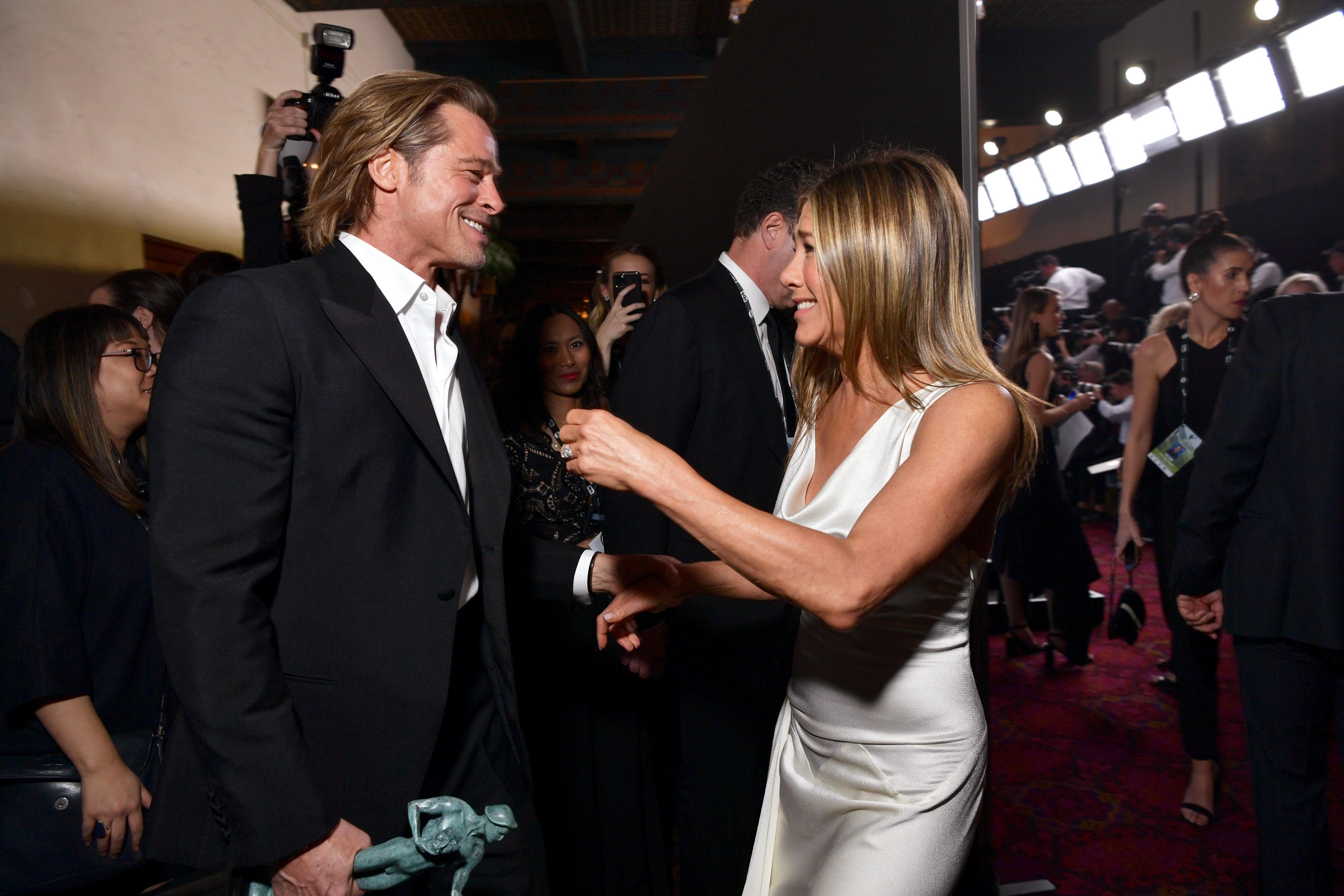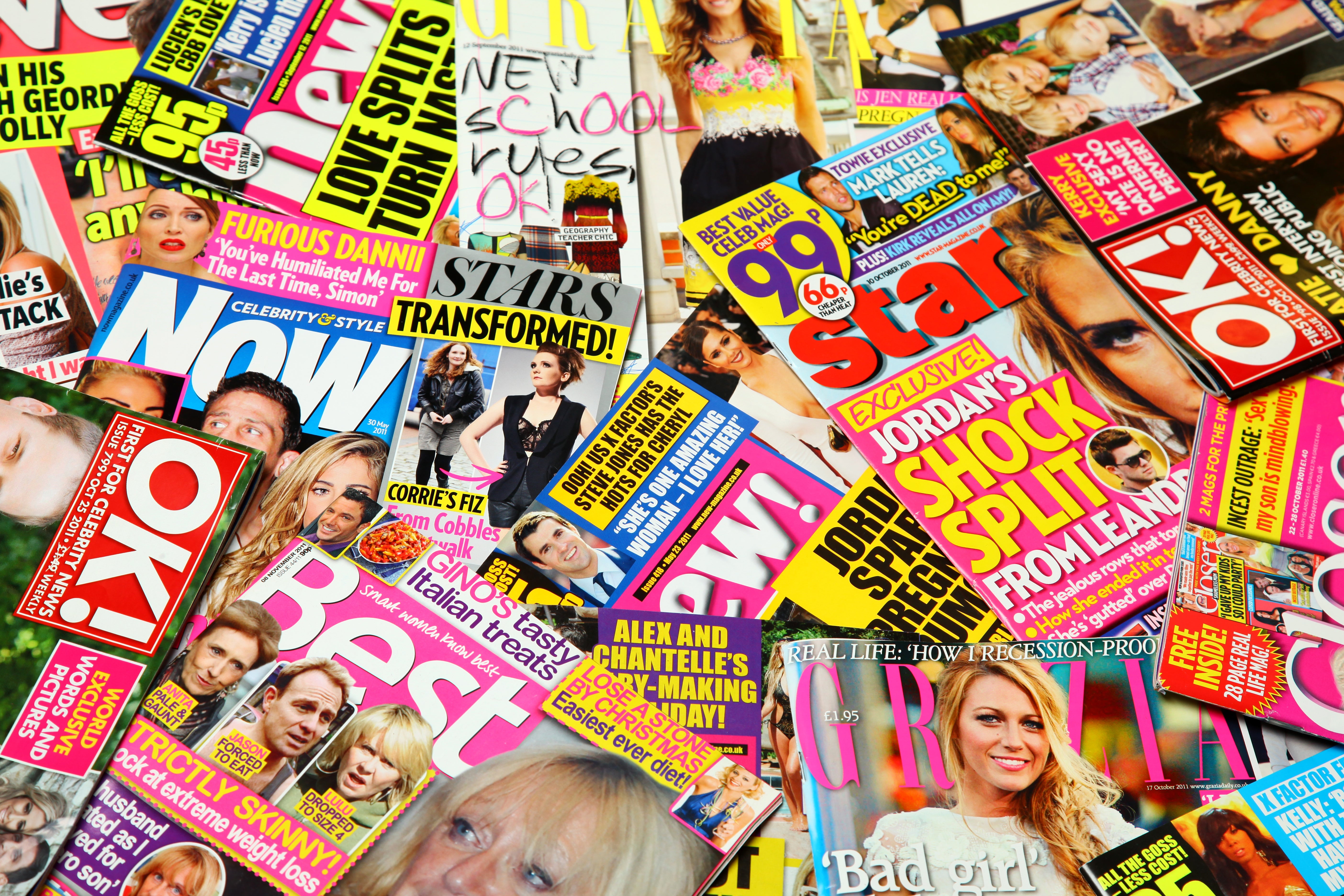Gossip can scandalise, entertain and keep us safe – so why are we ashamed of liking it?
The internet has transformed how we get our ‘goss’, with Instagram account DeuxMoi, podcast ‘Normal Gossip’, and TikTok ‘tea channels’ replacing celebrity print magazines, and ‘blind’ items the new normal. Isobel Lewis explores why we still love ‘dirt’ so much – and wonders if celebrities are getting more boring.


I would like to encourage everyone to look truly at themselves and ask themselves: if they, quote-unquote, don’t like gossip, are they being honest with themselves?” These words, uttered by podcaster Julia Furlan when she appeared as a guest on a recent episode of US podcast Normal Gossip, showed me I’d found my people. Host Kelsey McKinney had asked Furlan about her relationship with gossip and Furlan had jumped to its defence. Gossip has long been branded with shame, she said, and it was time that changed.
Where modern technology has changed the way we consume media, it’s also altered the way we share secrets. Glossy mags that once ruled the roost have been replaced by a complex sub-network of YouTube pages and TikTok accounts, often referred to as “tea channels”. These pages exist online solely to recap and collate the juiciest of dirt – sometimes on major celebrities, but more often on their fellow video creators. In a world where anyone can be a celebrity, anyone can, too, be the subject of celebrity gossip.
What hasn’t changed, however, are the negative, gendered associations linked with it. The word gossip itself was once used to refer to the women who stayed with a mother while she gave birth. Men imagined that women were using this time as a lighthearted get-together to spread falsehoods and rumours about them, rather than, say, push an entire human being out of their bodies.
As gossip as we knew it grew in popularity, it was still a much-derided practice. The gossip columnist figure really began with Walter Winchell, who scandalised New York media in the 1920s by bringing gossip to the refined world of print journalism. Two-thirds of Americans read Winchell’s columns or listened to his radio show, where he dished the dirt on the stars of the day. He was looked down on, but Winchell’s cultural sway couldn’t be underestimated. Ernest Lehman’s novella Tell Me About it Tomorrow (the inspiration for The Sweet Smell of Success) was a huge success when it was released in 1952, but film studios refused to touch it for five years because the character of JJ Hunsecker was clearly based on the still-powerful columnist.
Even now, gossip is a contentious subject. Everyone may talk about everything all the time online, but admitting to wanting to be let in on the secrets takes trust. I have a certain friend who, every time we meet up, greets me with the question: “Do you have any goss?” As Furlan says, we all enjoy gossip, but finding people who will admit to liking it enough to join you in it is a tricky business. If you don’t have those friendships IRL, Normal Gossip might just be the podcast for you.
Created by the independent, employee-owned media outlet Defector Media, the show is a fascinating exploration of the changing face of scandal. At a time when we’re oversaturated with anodyne celebrity content – their work-out regimes, McDonald’s orders, skincare routines all readily available – McKinney’s podcast flips the script. It asks: what if the stories you’re hearing are actually juicy, you just have no idea who they’re about. Listeners are encouraged to call or send a voice note – any good gossiper knows not to leave a paper trail – with totally outrageous, yet true, stories they’ve been told about random members of their communities.
“Blind items”, in which gossip is shared without naming the parties involved, are a staple of the gossip industry. The term for anonymous morsels of gossip was first used in the late 19th century, with everyone from cult celebrity newsletter Popbitch to The Daily Mirror’s infamous 3am column joining in the fun. More often than not, clues or cultural references will be littered throughout so people can figure it out – while the writer gets off scot-free, legally.

As with your standard blind items, names and places on Normal Gossip are changed to keep identities private. But the aim here isn’t to figure out who the story is about – it’s the content, rather than the subject, that makes it god-tier gossip. You know those rare occasions you hear about a celebrity scandal with details so obscure, it has to be true? All of the stories on Normal Gossip fit that mould. There’s the woman who’s convinced her neighbour is lying about running a marathon, a low-level scammer who specifically targets orchid growers, the school parent who couldn’t possibly be shooting squirrels, could he?
Host McKinney, who has written for The New York Times about the importance of gossip within church communities, is an arresting storyteller. She’s not afraid to laugh at the sheer ridiculousness of the stories or ask her guest (usually a comedian, journalist or other podcaster) what they’d do in this situation. The listener leaves McKinney a message which the presenter retells the story in her own words, and the story takes on a new life.
Like the show’s fans, Normal Gossip’s guests love a good chinwag. But when McKinney asks them about their relationship with gossip, a clear distinction is usually made. Enjoying being told a juicy story, that’s fine. But the idea of referring to themselves as “a gossip” is harder. Turning the word from a verb to a noun brings back those connotations of stupidity, frivolity, and untrustworthiness. While most of us can differentiate between a funny rumour and actual serious information not meant to share, being seen as a gossip can lose you access to both.
Over the past decades, the gossip industry has done little to help these ideas. Most people will associate the term with glossy celebrity magazines (or “gossip rags”, if you’re less generous). Specifically marketed at women, they would make big money speculating about the elusive lives of the rich and famous; whispering unfavourably about the dress sizes of Big Brother stars or sharing unproven “sources” suggesting Jennifer Aniston and Brad Pitt were going to get back together any day now, actually.

It’s no surprise that celebrity gossip magazines, like all print mediums, have come to lose their power in the digital age. But the tabloids have met an extra obstacle: social media. Instagram and Twitter have given us constant access to celebrities. Where they once craved privacy, the vast majority now document their lives for us – and magazines can’t keep up. Why flick through a copy of Heat at the hairdresser when you can get the updates right from the source, scrolling through hours of direct Kardashian content (or is it Kontent?).
For celebrities, social media has reinstated control of their image. Yet, arguably, our exposure to them hasn’t made them more interesting, but less. It’s no wonder we’d rather hear riveting stories about anonymous total nobodies than boring stories about famous celebrities.
In 2022, one Instagram account above all has aided in making the rich and famous overly accessible and, in turn, uninteresting. I’m talking, of course, about DeuxMoi, an account boasting 1.5 million followers and with a forthcoming book deal and subsequent HBO series. Run by an unidentified figure, it’s a space where anyone can submit anonymous tips about celebrities. They range from rumours of affairs and casting offers, to spotting your favourite reality TV contestant in Starbucks.
Sometimes celebrity news will break, and you’ll realise you saw it referenced on DeuxMoi weeks ago. But the account holder is keen to stress that the comments are totally unverifiable. “Read all emails with discernment as some are straight up bulls***,” they reminded followers earlier this month.
DeuxMoi tips tend to fall into two categories. On the one hand, you have your blind items. In theory, these posts should go under the radar like other blinds, but DeuxMoi’s growing power in pop culture has made them harder to ignore. Earlier this year, DeuxMoi actually apologised to former teen bad boy Jesse Metcalfe after he branded an anonymous tip (that didn’t name him, but did use his character name John Tucker) “bulls***”. DeuxMoi had some advice for famous people who think blinds are about them too. “Little tip… if you think an email is about you, don’t publicly respond to it if you don’t want to bring attention to yourself,” they said.

At the other end of the spectrum, we have the laughably mundane stuff. Spot Adam Driver and his family walking in a dog park? DeuxMoi should know. Learn that Gigi Hadid loves French toast bagels? Invaluable information! Even the stuff too boring for a celebrity’s Instagram Stories could make it to this account. Nothing exemplifies this more than one tipster, who was desperate to tell DeuxMoi that they’d spotted Joe Biden in Washington DC (they requested that the tip be kept “anon, pls”). The President of the United States? In the US capital? Whatever next?!
With constant access to the dullest parts of celebrities’ lives, you can see why gossip has maintained these ideas of frivolity. But just because gabbing about celebrities can be fun, that doesn’t mean it’s without value. Long before the #MeToo scandal broke in 2017, there were rumours within the industry about many of the high-profile figures later accused of sexual misconduct and inappropriate behaviour. Sharing was a way of protecting others, of telling them the people you should and shouldn’t go near.
When the first claims of sexual misconduct were made against DJ Tim Westwood in a BBC and Guardian investigation published in April (Westwood has denied all the allegations), an awful lot of people claimed that they’d heard rumours of bad behaviour. A new documentary released by the BBC this month opens with clips of TikTok users sarcastically claiming to be “shocked” by the allegations. The documentary itself was called Hip Hop’s Open Secret, suggesting that people had heard rumours, or gossip, amongst themselves about Westwood and shared them to protect each other.
It’s something Normal Gossip, where the stories typically stay within the cheating/family drama/occasional low-level cult realm, is hyperaware of. On a recent episode of the podcast, Julia Furlan said that she felt gossip was an important method for “deconstructing power”. Asked what she meant, Furlan explained: “I find it very powerful when people create a whisper network and use gossip as a power element.” To her, gossip, particularly in a professional setting, allowed individuals to collectivise against “the big powerful people”. “We don’t think enough and don’t make explicit enough power relationships,” she said. “If we did that more, then we would realise that gossip is actually incredibly powerful.”
The internet has changed the gossip machine immeasurably. Sharing secrets has been made infinitely easier, but in making the process more open, the general distrust around it has continued. Normal Gossip may be a fun listen, but it also says a lot about our morphing relationships with celebrities and their waning cultural power. Call me old-fashioned, but I’d rather hear about some passive-aggressive comments on a community WhatsApp group than what’s in Kendall Jenner’s make-up bag any day.
Join our commenting forum
Join thought-provoking conversations, follow other Independent readers and see their replies
Comments


Bookmark popover
Removed from bookmarks